大学英语综合教程5课文翻译
新编英语教程5课文翻译(部分)
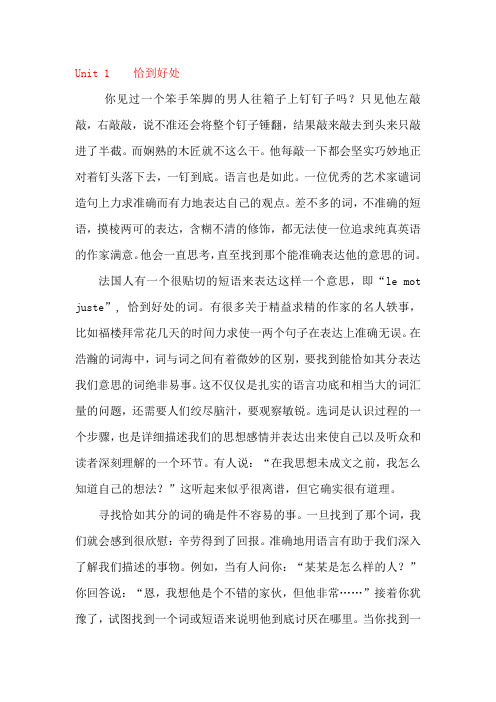
Unit 1 恰到好处你见过一个笨手笨脚的男人往箱子上钉钉子吗?只见他左敲敲,右敲敲,说不准还会将整个钉子锤翻,结果敲来敲去到头来只敲进了半截。
而娴熟的木匠就不这么干。
他每敲一下都会坚实巧妙地正对着钉头落下去,一钉到底。
语言也是如此。
一位优秀的艺术家谴词造句上力求准确而有力地表达自己的观点。
差不多的词,不准确的短语,摸棱两可的表达,含糊不清的修饰,都无法使一位追求纯真英语的作家满意。
他会一直思考,直至找到那个能准确表达他的意思的词。
法国人有一个很贴切的短语来表达这样一个意思,即“le m ot juste”, 恰到好处的词。
有很多关于精益求精的作家的名人轶事,比如福楼拜常花几天的时间力求使一两个句子在表达上准确无误。
在浩瀚的词海中,词与词之间有着微妙的区别,要找到能恰如其分表达我们意思的词绝非易事。
这不仅仅是扎实的语言功底和相当大的词汇量的问题,还需要人们绞尽脑汁,要观察敏锐。
选词是认识过程的一个步骤,也是详细描述我们的思想感情并表达出来使自己以及听众和读者深刻理解的一个环节。
有人说:“在我思想未成文之前,我怎么知道自己的想法?”这听起来似乎很离谱,但它确实很有道理。
寻找恰如其分的词的确是件不容易的事。
一旦找到了那个词,我们就会感到很欣慰:辛劳得到了回报。
准确地用语言有助于我们深入了解我们描述的事物。
例如,当有人问你:“某某是怎么样的人?”你回答说:“恩,我想他是个不错的家伙,但他非常……”接着你犹豫了,试图找到一个词或短语来说明他到底讨厌在哪里。
当你找到一个恰当的短语的时候,你发觉自己对他的看法更清楚,也更精确了。
一些英语词汇词根相同而意义却截然不同。
例如human 和humane,二者的词根相同,词义也相关,但用法完全不同。
“ human action (人类行为)”和“humane action ( 人道行为)”完全是两码事。
我们不能说“人道权力宣言”,而是说“人权宣言”。
有一种屠杀工具叫“humane killer ( 麻醉屠宰机),而不是human killer ( 杀人机器)。
全新版大学英语综合教程5 unit1 课后答案

1.(1) allot
(2) go through fire and water
(3) reside
(4) sobbed
(5) made no mention of
(6) sacrifice
(7) came upon
(8) rhythm
2. She had thought that books were natural wonders, coming up of themselves like grass. So it was "startling and disappointing" for her to find out that story books had been, contrary to her expectations, written by people.
(8) Answer: an old Ford
P24 cloze
(1) Answer: go through fire and water
(2) Answer: salary
(3) Answer: give
(4) Answer: no peace
(5) Answer: sink into
(7) inward
5. (1) Answer: have come upon / across
(2) Answer: had come out
(3) Answer: come on / up
(4) Answer: came across
(5) Answer: comes down to
7. The book was completely worn out - it was lacking its front cover, the back held on by strips of pasted paper, and the pages stained; its illustrations had come unattached. Welty's father had lost his mother when he was seven, and this book was the only book he as a little boy had had of his own. Although he had never made any mention to his own children of the book, he had brought it along with him from Ohio to their house and shelved it in their bookcase.
全新版大学英语(第二版)综合教程5-Unit-6课后答案及课文翻译
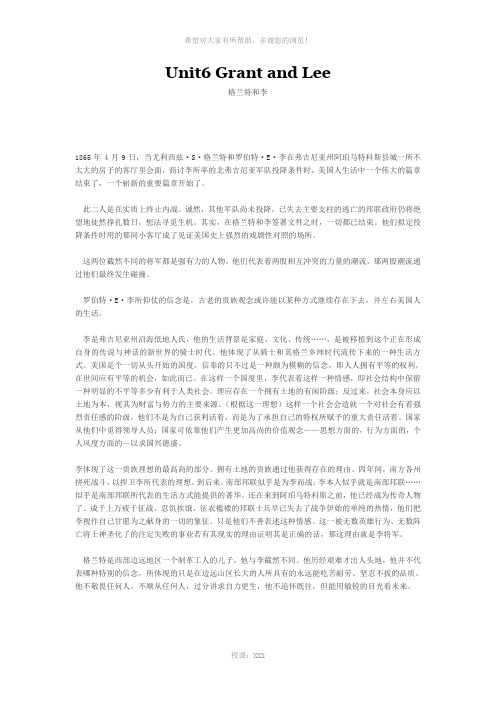
Unit6 Grant and Lee格兰特和李1865年4月9日,当尤利西兹·S·格兰特和罗伯特·E·李在弗吉尼亚州阿珀马特科斯县城一所不太大的房子的客厅里会面,商讨李所率的北弗吉尼亚军队投降条件时,美国人生活中一个伟大的篇章结束了,一个崭新的重要篇章开始了。
此二人是在实质上终止内战。
诚然,其他军队尚未投降,已失去主要支柱的逃亡的邦联政府仍将绝望地徒然挣扎数日,想法寻觅生机。
其实,在格兰特和李签署文件之时,一切都已结束。
他们拟定投降条件时用的那间小客厅成了见证美国史上强烈的戏剧性对照的场所。
这两位截然不同的将军都是强有力的人物,他们代表着两股相互冲突的力量的潮流,那两股潮流通过他们最终发生碰撞。
罗伯特·E·李所仰仗的信念是,古老的贵族观念或许能以某种方式继续存在下去,并左右美国人的生活。
李是弗吉尼亚州沿海低地人氏,他的生活背景是家庭、文化、传统……,是被移植到这个正在形成自身的传说与神话的新世界的骑士时代。
他体现了从骑士和英格兰乡绅时代流传下来的一种生活方式。
美国是个一切从头开始的国度,信奉的只不过是一种颇为模糊的信念,即人人拥有平等的权利,在世间应有平等的机会,如此而已。
在这样一个国度里,李代表着这样一种情感,即社会结构中保留一种明显的不平等多少有利于人类社会。
理应存在一个拥有土地的有闲阶级;反过来,社会本身应以土地为本,视其为财富与势力的主要来源。
(根据这一理想)这样一个社会会造就一个对社会有着强烈责任感的阶级,他们不是为自己获利活着,而是为了承担自己的特权所赋予的重大责任活着。
国家从他们中觅得领导人员;国家可依靠他们产生更加高尚的价值观念——思想方面的,行为方面的,个人风度方面的—以求国兴德盛。
李体现了这一贵族理想的最高尚的部分。
拥有土地的贵族通过他获得存在的理由。
四年间,南方各州拼死战斗,以捍卫李所代表的理想。
到后来,南部邦联似乎是为李而战;李本人似乎就是南部邦联……似乎是南部邦联所代表的生活方式能提供的菁华。
全新版大学英语综合教程5课文原文及翻译@1和2单元教材

咱们吃素吧!如果有一件事,既能增进健康、减少患上食物引起的疾病的危险,又有助于保护环境、保护千万动物安全生存,你做不做?我说的这件事就是每次坐下来就餐时挑选菜肴。
一百多万加拿大人已经行动起来:他们决定不吃肉。
变化速度之快令人惊叹。
素食品的销售额大大增加,前所未有。
尤受欢迎的是无肉汉堡包和热狗,以及以蔬为主的印度、中国、墨西哥、意大利和日本的菜肴。
推动人们转向素食的是医学研究提出的关于如何增进健康的建议。
一项又一项的研究都揭示了同样的基本事实:果蔬降低患慢性病的危险;肉类食品则增加这种危险。
美国饮食学协会指出,“科学资料表明,素食与降低多种慢性变性疾病的患病危险肯定有关系。
”去年秋天,在检验了4500个饮食与癌症的研究报告之后,世界癌症研究基金会直截了当地指出:“我们一向利用不合适的养料来维持人类生理引擎的运转。
”据威尔夫大学营养科学教授布鲁斯·霍拉勃称,这一“不合适的养料”致使加拿大每年用于治疗变性疾病的费用高达4000亿(加)元。
肉类食品存在严重的营养缺陷:它们不含纤维,含有过多的饱和脂肪和胆固醇,甚至可能含有微量的激素、类固醇和抗菌素。
牛肉、猪肉、鸡肉或鱼肉都一样。
肉类食品也是越来越广为人知的大肠杆菌、弯曲菌以及其他致病细菌的孳生地。
据加拿大食品检验机构称,十分之六的鸡染有沙门氏菌。
吃肉无异于玩俄式轮盘赌,拿你的健康做赌资。
既然如此,政府为什么不采取任何措施?很遗憾,政府屈服于强有力的院外活动集团的压力,如牛肉信息中心、加拿大禽蛋营销公司、加拿大乳牛场场主协会等。
根据信息自由法案获得的有关文件记载,这些集团迫使加拿大最新食品指南在1993年公布前作出修改。
这并不奇怪。
即使建议动物蛋白质的摄入量减少一丁点儿都会给这些企业带来每年数十亿元的损失。
健康和食品安全是选择素食生活方式令人信服的理由,但此外还有更为重大的因素要考虑。
以饲养动物为基础的农业是世界上对环境破坏最严重的产业之一。
想一想培育、饲养、建牲畜栏、运输、加工和包装加拿大每年宰杀的5亿头牲畜所需的巨大资源。
全大学英语综合教程5课文翻译

全大学英语综合教程5课文翻译1Unit1One Writer's XXX作家起步时1.我从两三岁起就知道,家中随便在哪个房间里,白天无论在什么时间,都可以念书或听人念书。
母亲念书给我听。
上午她都在那间大卧室里给我念,两人一起坐在她那把摇椅里,我们摇晃时,椅子发出有节奏的滴答声,好像有只唧唧鸣叫的蟋蟀在伴着读故事。
冬日午后,她常在餐厅里烧着煤炭的炉火前给我念,XXX自XXX发出“咕咕”声时,故事便结束了;晚上我在自己床上睡下后她也给我念。
想必我是不让她有一刻清静。
有时她在厨房里一边坐着搅制黄油一边给我念,故事情节就随着搅制黄油发出的抽抽搭搭的声响不断展开。
我的奢望是她念我来搅拌;有一次她满足了我的愿望,可是我要听的故事她念完了,她要的黄油我却还没弄好。
她念起故事来富有表情。
比如,她念《穿靴子的猫》时,你就没法不相信她对猫一概怀疑。
2当我得知故事书原来是人写出来的,书本原来不是什么大自然的奇迹,不像草那样自生自长时,真是又震惊又失望。
不过,姑且不论书本从何而来,我不记得自己有什么时候不爱书——书本本身、封面、装订、印着文字的书页,还有油墨味、那种沉甸甸的感觉,以及把书抱在怀里时那种将我征服、令我陶醉的感觉。
还没识字,我就想读书了,一心想读所有的书。
3我的父母都不是来自那种买得起许多书的家庭。
然而,虽然买书准得花去他不少薪金,作为一家成立不久的保险公司最年轻的职员,父亲一直在精心挑选、不断订购他和母亲认为儿童成长应读的书。
他们购书首先是为了我们的前程。
5多亏了我的父母,我很早就接触了受人喜爱的XXX。
书橱里有一整套XXX文集和一套不全的XXX作品集,这些书最终将父母和孩子联结在一起。
6读摆在我面前的书,读着读着便发现一本又破又旧的书,是我父亲小时候的。
书名是《桑福徳与默顿》。
我不相信如今还有谁会记得这本书。
那是XXX.戴在18世纪80年代撰写的一本著名的进行道德教育的故事书,可该书的扉页上并没有提及他;上面写的是《桑福徳与默顿简易本》,XXX.XXX著。
全新版大学英语综合教程课文原文及翻译
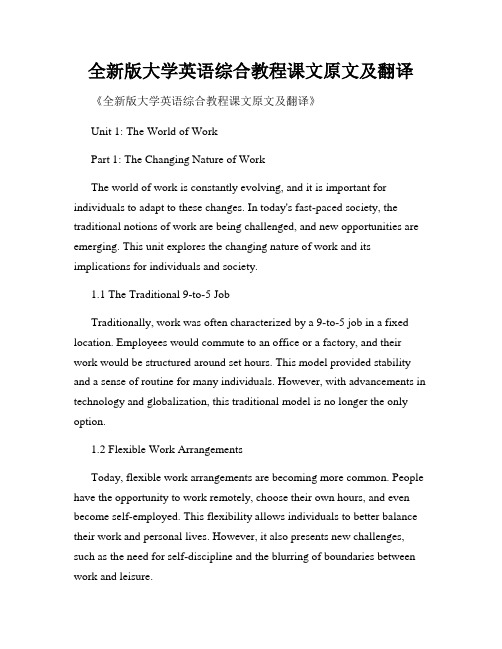
全新版大学英语综合教程课文原文及翻译《全新版大学英语综合教程课文原文及翻译》Unit 1: The World of WorkPart 1: The Changing Nature of WorkThe world of work is constantly evolving, and it is important for individuals to adapt to these changes. In today's fast-paced society, the traditional notions of work are being challenged, and new opportunities are emerging. This unit explores the changing nature of work and its implications for individuals and society.1.1 The Traditional 9-to-5 JobTraditionally, work was often characterized by a 9-to-5 job in a fixed location. Employees would commute to an office or a factory, and their work would be structured around set hours. This model provided stability and a sense of routine for many individuals. However, with advancements in technology and globalization, this traditional model is no longer the only option.1.2 Flexible Work ArrangementsToday, flexible work arrangements are becoming more common. People have the opportunity to work remotely, choose their own hours, and even become self-employed. This flexibility allows individuals to better balance their work and personal lives. However, it also presents new challenges, such as the need for self-discipline and the blurring of boundaries between work and leisure.1.3 The Gig EconomyThe rise of the gig economy is another significant change in the world of work. In this model, individuals take on short-term or freelance jobs, often facilitated by online platforms. This provides them with more autonomy and the ability to pursue multiple income streams. However, it also means less job security and benefits compared to traditional employment.1.4 The Importance of Lifelong LearningWith the changing nature of work, the importance of lifelong learning cannot be overstated. Individuals need to continually update their skills and knowledge in order to remain competitive in the job market. This includes developing new technological competencies and adaptability to navigate future changes in the workplace.Part 2: The Impact of Work on Identity and Well-beingWork plays a significant role in shaping individual identity and overall well-being. How individuals perceive their work and the meaning they derive from it can greatly impact their satisfaction and happiness.2.1 Work as a Source of IdentityFor many people, work is not just a way to earn a living but also a source of identity and purpose. The type of work one engages in can be closely tied to personal values and ambitions. However, it is important to recognize that work should not be the sole determinant of a person's self-worth. Finding a balance between work and other aspects of life is crucial for overall well-being.2.2 Work-Life BalanceAchieving work-life balance is a constant challenge in today's connected world. The boundaries between work and personal life can easily blur, leading to increased stress and burnout. Employers and individuals need to actively promote strategies and policies that enable employees to have a healthy integration of work and personal life.2.3 The Pursuit of Meaningful WorkMany individuals strive to find work that is not only financially rewarding but also personally fulfilling. Meaningful work gives individuals a sense of purpose and satisfaction. This can be achieved by aligning personal values and passions with one's chosen career path.2.4 Work and Mental HealthThe relationship between work and mental health is complex. While work can provide a sense of structure and purpose, it can also contribute to stress and anxiety. Employers and society as a whole need to prioritize mental health support in the workplace and foster a culture that promotes work-life balance and overall well-being.ConclusionThe world of work is undergoing significant changes, requiring individuals to adapt and embrace new opportunities. The impact of work on identity and well-being cannot be underestimated. It is crucial for individuals, employers, and society to work together to create a more balanced and fulfilling work environment. By recognizing the evolving nature of work andaddressing its challenges, we can create a future where individuals find meaning and satisfaction in their careers.。
大学英语综合教程第三册unit5 第一篇课文翻译
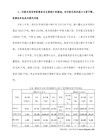
9 然而,年轻男子却在琳赛对面的位子上坐了下来,自我介绍说是约翰尼,并开始毫不避讳地跟她谈论起自己的感受以及他与萨拉的恋情,这激起了琳赛的兴趣。而他也提到 了那些抢劫案,说四起案件中有三起是萨拉和他一起干的。他说,萨拉一点也没害怕,她甚至觉得这事很刺激。他给她看了一些照片,那是萨拉住在波特兰的时候和他在公寓 里拍的合影。琳赛注意到在他们谈话的大部分时间里,他都在摆弄外套上的拉链。接下来,她和约翰尼就像素未谋面一样分手了。而琳赛也明白了为什么萨拉在这里呆了那么 久,因为和她们波澜不兴的家乡丘奇兰德相比,这里的确很美丽。
10 当天晚些时候,琳赛回到了宾馆收拾行李,准备第二天上午回丘奇兰德。她急着回家,因为她已经找到了证据,结束了调查。第二天,她打电话给妈妈讲述了这次旅程的细节;然而,从妈妈的口气中,她感觉妈妈似乎在隐瞒着什么。次日一早,琳赛来到警察局,打算和办理四年前那个案子的警察谈 话。她被带进一个昏暗的小房间,里面有两个警探。于是,她急急慌慌地讲述了起来,并且手里拿着一些记录作为佐证。看到琳赛为洗脱嫌疑投入了如此多的时间、精力和金 钱,两位警探对此甚为好奇。
Unit3Lying全新版大学英语综合教程五课文翻译
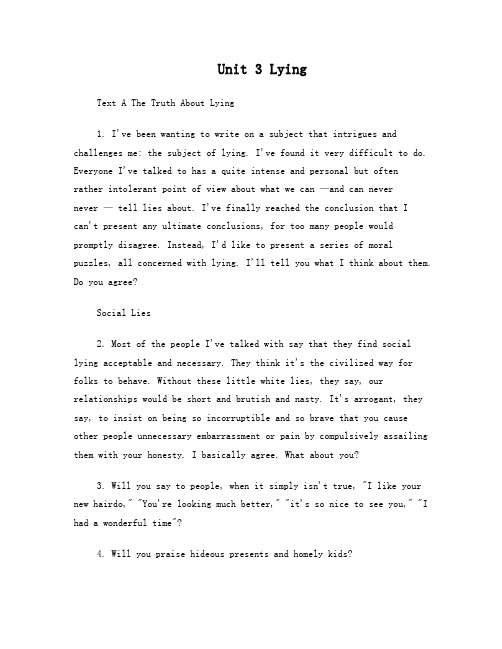
Unit 3 LyingText A The Truth About Lying1. I've been wanting to write on a subject that intrigues and challenges me: the subject of lying. I've found it very difficult to do. Everyone I've talked to has a quite intense and personal but oftenrather intolerant point of view about what we can —and can nevernever — tell lies about. I've finally reached the conclusion that Ican't present any ultimate conclusions, for too many people would promptly disagree. Instead, I'd like to present a series of moral puzzles, all concerned with lying. I'll tell you what I think about them. Do you agree?Social Lies2. Most of the people I've talked with say that they find social lying acceptable and necessary. They think it's the civilized way for folks to behave. Without these little white lies, they say, our relationships would be short and brutish and nasty. It's arrogant, they say, to insist on being so incorruptible and so brave that you cause other people unnecessary embarrassment or pain by compulsively assailing them with your honesty. I basically agree. What about you?3. Will you say to people, when it simply isn't true, "I like your new hairdo," "You're looking much better," "it's so nice to see you," "I had a wonderful time"?4. Will you praise hideous presents and homely kids?5. Will you decline invitations with "We're busy that night — so sorry we can't come," when the truth is you'd rather stay home than dine with the So-and-sos?6. And even though, as I do, you may prefer the polite evasion of "You really cooked up a storm "instead of "The soup" —which tastes like warmed-over coffee —"is wonderful," will you, if you must, proclaim it wonderful?7. There's one man I know who absolutely refuses to tell social lies. "I can't play that game," he says; "I'm simply not made that way." And his answer to the argument that saying nice things to someonedoesn't cost anything is, "Yes, it does — it destroys your credibility." Now, he won't, unsolicited, offer his views on thepainting you just bought, but you don't ask his frank opinion unless you want frank, and his silence at those moments when the rest of us liars are muttering, "Isn't it lovely?" is, for the most part, eloquent enough. My friend does not indulge in what he calls "flattery, false praise and mellifluous comments." When others tell fibs he will not go along. He says that social lying is lying, that little white lies are still lies. And he feels that telling lies is morally wrong. What about you?Peace-Keeping Lies8. Many people tell peace-keeping lies: lies designed to avoid irritation or argument, lies designed to shelter the liar from possible blame or pain; lies (or so it is rationalized) designed to keep trouble at bay without hurting anyone.9. I tell these lies at times, and yet I always feel they're wrong.I understand why we tell them, but still they feel wrong. And whenever I lie so that someone won't disapprove of me or think less of me or holler at me, I feel I'm a bit of a coward, I feel I'm dodging responsibility, I feel...guilty. What about you?10. Do you, when you're late for a date because you overslept, say that you're late because you got caught in a traffic jam?11. Do you, when you forget to call a friend, say that you called several times but the line was busy?12. Do you, when you didn't remember that it was your father's birthday, say that his present must be delayed in the mail?13. And when you're planning a weekend in New York City and you're not in the mood to visit your mother, who lives there, do you conceal —with a lie, if you must — the fact that you'll be in New York? Or do you have the courage — or is it the cruelty? — to say, "I'll be in New York, but sorry — I don't plan on seeing you"?14. (Dave and his wife Elaine have two quite different points of view on this very subject. He calls her a coward. She says she's being wise. He says she must assert her right to visit New York sometimes and not see her mother. To which she always patiently replies: "Why should we have useless fights? My mother's too old to change. We get along much better when I lie to her.")15. Finally, do you keep the peace by telling your husband lies on the subject of money? Do you reduce what you really paid for your shoes?And in general do you find yourself ready, willing and able to lie to him when you make absurd mistakes or lose or break things?16. "I used to have a romantic idea that part of intimacy was confessing every dumb thing that you did to your husband. But after a couple of years of that," says Laura, "haveI changed my mind!"17. And having changed her mind, she finds herself telling peacekeeping lies. And yes, I tell them too. What about you?Protective Lies18. Protective lies are lies folks tell —often quite seriouslies —because they're convinced that the truth would be too damaging. They lie because they feel there are certain human values that supersede the wrong of having lied. They lie, not for personalgain, but because they believe it's for the good of the personthey're lying to. They lie to those they love, to those who trust them most of all, on the grounds that breaking this trust is justified.19. They may lie to their children on money or marital matters.20. They may lie to the dying about the state of their health.21. They may lie to their closest friend because the truth about her talents or son or psyche would be — or so they insist — utterly devastating.22. I sometimes tell such lies, but I'm aware that it's quite presumptuous to claim I know what's best for others to know. That's called playing God . That's called manipulation and control. And wenever can be sure, once we start to juggle lies, just where they'll land, exactly where they'll roll.23. And furthermore, we may find ourselves lying in order to backup the lies that are backing up the lie we initially told.24. And furthermore —let's be honest —if conditions were reversed, we certainly wouldn't want anyone lying to us.25. Yet, having said all that, I still believe that there are times when protective lies must nonetheless be told. What about you?Trust-Keeping Lies26. Another group of lies are trust-keeping lies, lies that involve triangulation, with A (that's you) telling lies to B on behalf of C (whose trust you'd promised to keep). Most people concede that onceyou've agreed not to betray a friend's confidence, you can't betray it, even if you must lie. But I've talked with people who don't want you telling them anything that they might be called on to lie about.27. "I don't tell lies for myself," says Fran, "and I don't want to have to tell them for other people." Which means, she agrees, that ifher best friend is having an affair, she absolutely doesn't want to know about it.28. "Are you saying," her best friend asks, "that you'd betray me?"29. Fran is very pained but very adamant. "I wouldn't want to betray you, so…don't tell me anything about it."30. Fran's best friend is shocked. What about you?31. Do you believe you can have close friends if you're not prepared to receive their deepest secrets?32. Do you believe you must always lie for your friends?33. Do you believe, if your friend tells a secret that turns out to be quite immoral or illegal, that once you've promised to keep it, you must keep it?34. And what if your friend were your boss — if you were perhaps one of the President's men — would you betray or lie for him over, say, Watergate?35. As you can see, these issues get terribly sticky.36. It's my belief that once we've promised to keep a trust, we must tell lies to keep it. I also believe that we can't tell Watergate lies. And if these two statements strike you as quite contradictory,you're right —they're quite contradictory. But for now they're the best I can do. What about you?37. There are those who have no talent for lying.38. "Over the years, I tried to lie," a friend of mine explained, "but I always got found out and I always got punished. I guess I gavemyself away because I feel guilty about any kind of lying. It looks as if I'm stuck with telling the truth."39. For those of us, however, who are good at telling lies, for those of us who lie and don't get caught, the question of whether or not to lie can be a hard and serious moral problem. I liked the remark of a friend of mine who said, "I'm willing to lie. But just as a lastresort — the truth's always better."40. "Because," he explained, "though others may completely accept the lie I'm telling, I don't."41. I tend to feel that way too.42. What about you?关于说谎的真相朱迪斯·维奥斯特我一直想写一个令我深感兴趣的话题:关于说谎的问题。
- 1、下载文档前请自行甄别文档内容的完整性,平台不提供额外的编辑、内容补充、找答案等附加服务。
- 2、"仅部分预览"的文档,不可在线预览部分如存在完整性等问题,可反馈申请退款(可完整预览的文档不适用该条件!)。
- 3、如文档侵犯您的权益,请联系客服反馈,我们会尽快为您处理(人工客服工作时间:9:00-18:30)。
One Writer's Beginnings1 I learned from the age of two or three that any room in our house, at any time of day, was there to read in, or to be read to. My mother read to me. She'd read to me in the big bedroom in the mornings, when we were in her rocker together, which ticked in rhythm as we rocked, as though we had a cricket accompanying the story. She'd read to me in the dining room on winter afternoons in front of the coal fire, with our cuckoo clock ending the story with "Cuckoo", and at night when I'd got in my own bed. I must have given her no peace. Sometimes she read to me in the kitchen while she sat churning, and the churning sobbed along with any story. It was my ambition to have her read to me while I churned; once she granted my wish, but she read off my story before I brought her butter. She was an expressive reader. When she was reading "Puss in Boots," for instance, it was impossible not to know that she distrusted all cats.作家起步时我从两三岁起就知道,家中随便在哪个房间里,白天无论在什么时间,都可以念书或听人念书。
母亲念书给我听。
上午她都在那间大卧室里给我念,两人一起坐在她那把摇椅里,我们摇晃时,椅子发出有节奏的滴答声,好像有只唧唧鸣叫的蟋蟀在伴着读故事。
冬日午后,她常在餐厅里烧着煤炭的炉火前给我念,布谷鸟自鸣钟发出“咕咕”声时,故事便结束了;晚上我在自己床上睡下后她也给我念。
想必我是不让她有一刻清静。
有时她在厨房里一边坐着搅制黄油一边给我念,故事情节就随着搅制黄油发出的抽抽搭搭的声响不断展开。
我的奢望是她念我来搅拌;有一次她满足了我的愿望,可是我要听的故事她念完了,她要的黄油我却还没弄好。
她念起故事来富有表情。
比如,她念《穿靴子的猫》时,你就没法不相信她对猫一概怀疑。
2 It had been startling and disappointing to me to find out that story books had been written by people, that books were not natural wonders, coming up of themselves like grass. Yet regardless of where they came from, I cannot remember a time when I was not in love with them —with the books themselves, cover and binding and the paper they were printed on, with their smell and their weight and with their possession in my arms, captured and carried off to myself. Still illiterate, I was ready for them, committed to all the reading I could give them.当我得知故事书原来是人写出来的,书本原来不是什么大自然的奇迹,不像草那样自生自长时,真是又震惊又失望。
不过,姑且不论书本从何而来,我不记得自己有什么时候不爱书——书本本身、封面、装订、印着文字的书页,还有油墨味、那种沉甸甸的感觉,以及把书抱在怀里时那种将我征服、令我陶醉的感觉。
还没识字,我就想读书了,一心想读所有的书。
3 Neither of my parents had come from homes that could afford to buy many books, but though it must have been something of a strain on his salary, as the youngest officer in a young insurance company, my father was all the while carefully selecting and ordering away for what he and Mother thought we children should grow up with. They bought first for the future .我的父母都不是来自那种买得起许多书的家庭。
然而,虽然买书准得花去他不少薪金,作为一家成立不久的保险公司最年轻的职员,父亲一直在精心挑选、不断订购他和母亲认为儿童成长应读的书。
他们购书首先是为了我们的前程。
4 Besides the bookcase in the living room, which was always called "the library", there were the encyclopedia tables and dictionary stand under windows in our dining room. Here to help us grow up arguing around the dining room table were the Unabridged Webster, the Columbia Encyclopedia, Compton's Pictured Encyclopedia, the Lincoln Library of Information, and later the Book of Knowledge. In "the library", inside the bookcase were books I could soon begin on —and I did, reading them all alike and as they came, straight down their rows, top shelf to bottom. My mother read secondarily for information; she sank as a hedonist into novels. She read Dickens in the spirit in which she would have eloped with him. The novels of her girlhood that had stayed on in her imagination, besides those of Dickens and Scott and Robert Louis Stevenson, were Jane Eyre, Trilby, The Woman in White, Green Mansions, King Solomon's Mines.除了客厅里有一向被称作“图书室”的书橱,餐厅的窗子下还有几张摆放百科全书的桌子和一个字典架。
这里有伴随我们在餐桌旁争论着长大的《韦氏大词典》、《哥伦比亚百科全书》、《康普顿插图百科全书》、《林肯资料文库》,以及后来的《知识库》。
“图书馆”书橱里的书没过多久我就能读了——我的确读了,全都读了,按着顺序,一排接着一排读,从最上面的书架一直读到最下面的书架。
母亲读书最重要的不在获取信息。
她是为了享受快乐而埋头读小说。
她读狄更斯时的神情简直就像要跟他私奔似的。
她少女时代读的小说印在了她心头的,除了狄更斯、司各特和罗伯特?路易斯?斯蒂文森等人的作品之外,还有《简?爱》、《切尔比》、《白衣女士》、《绿厦》和《所罗门王的矿藏》。
5 To both my parents I owe my early acquaintance with a beloved Mark Twain. There was a full set of Mark Twain and a short set of Ring Lardner in our bookcase, and those were the volumes that in time united us all, parents and children.多亏了我的父母,我很早就接触了受人喜爱的马克?吐温。
书橱里有一整套马克?吐温文集和一套不全的林?拉德纳作品集,这些书最终将父母和孩子联结在一起。
6 Reading everything that stood before me was how I came upon a worn old book that had belonged to my father as a child. It was called Sanford and Merton. Is there anyone left who recognizes it, I wonder? It is the famous moral tale written by Thomas Day in the 1780s, but of him no mention is made on the title page of this book; here it is Sanford and Merton in Words of One Syllable by Mary Godolphin. Here are the rich boy and the poor boy and Mr. Barlow, their teacher and interlocutor, in long discourses alternating with dramatic scenes —anger and rescue allotted to the rich and the poor respectively. It ends with not one but two morals, both engraved on rings: "Do what you ought, come what may," and "If we would be great, we must first learn to be good."我一本接一本阅读摆在我面前的书,读着读着便发现一本又破又旧的书,是我父亲小时候的。
